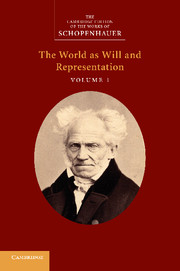Book contents
- Frontmatter
- Contents
- General editor's preface
- Editorial notes and references
- Introduction
- Notes on text and translation
- Chronology
- Bibliography
- THE WORLD AS WILL AND REPRESENTATION VOLUME 1
- Preface to the first edition
- Preface to the second edition
- Preface to the third edition
- First Book: The world as representation, first consideration. Representation subject to the principle of sufficient reason: the object of experience and science
- Second Book: The world as will, first consideration. The objectivation of the will
- Third Book: The world as representation, second consideration. Representation independent of the principle of sufficient reason: the Platonic Idea: the object of art
- Fourth Book: The world as will, second consideration. With the achievement of self-knowledge, affirmation and negation of the will to life
- Appendix: Critique of the Kantian Philosophy
- Variants in different editions
- Glossary of names
- Index
Second Book: The world as will, first consideration. The objectivation of the will
Published online by Cambridge University Press: 06 December 2010
- Frontmatter
- Contents
- General editor's preface
- Editorial notes and references
- Introduction
- Notes on text and translation
- Chronology
- Bibliography
- THE WORLD AS WILL AND REPRESENTATION VOLUME 1
- Preface to the first edition
- Preface to the second edition
- Preface to the third edition
- First Book: The world as representation, first consideration. Representation subject to the principle of sufficient reason: the object of experience and science
- Second Book: The world as will, first consideration. The objectivation of the will
- Third Book: The world as representation, second consideration. Representation independent of the principle of sufficient reason: the Platonic Idea: the object of art
- Fourth Book: The world as will, second consideration. With the achievement of self-knowledge, affirmation and negation of the will to life
- Appendix: Critique of the Kantian Philosophy
- Variants in different editions
- Glossary of names
- Index
Summary
Nos habitat, non tartara, sed nec sidera coeli:
Spiritus, in nobis qui viget, illa facit.
[‘It dwells in us, not in the underworld, nor in the heavenly stars: All this is brought to pass by the living spirit in us.’ Agrippa von Nettesheim]
In the First Book we considered representation only as such, which is to say only with respect to its general form. Of course when it comes to abstract representations (concepts), we are familiar with their content as well, since they acquire this content and meaning only through their connection to intuitive representation and would be worthless and empty without it. This is why we will have to focus exclusively on intuitive representation in order to learn anything about its content, its more precise determinations, or the configurations it presents to us. We will be particularly interested in discovering the true meaning of intuitive representation; we have only ever felt this meaning before, but this has ensured that the images do not pass by us strange and meaningless as they would otherwise necessarily have done; rather, they speak and are immediately understood and have an interest that engages our entire being.
We turn to mathematics, natural science and philosophy, each of which raises our hope that it might shed some light on the problem. – But first we find that philosophy is a many-headed monster with each head speaking a different language.
Information
- Type
- Chapter
- Information
- Schopenhauer: 'The World as Will and Representation' , pp. 119 - 190Publisher: Cambridge University PressPrint publication year: 2010
